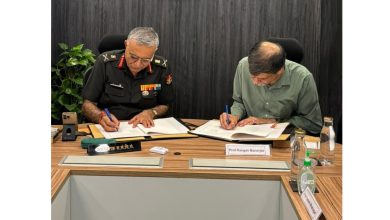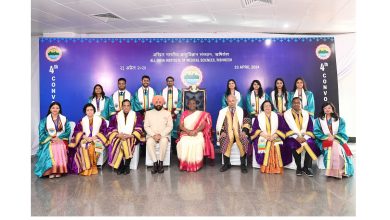Summit on Health Insurance Vision 2030 to come up with Vision Document in three months

Nine recommendations were suggested
The Summit on Health Insurance Vision 2030 held at Federation of Telangana Chambers of Commerce and Industry (FTCCI) will make a document in the next three months, disclosed Bejon Misra, Chair, Health Insurance Vision 2020, at the closing of the Round Table Discussion of all the stakeholders such as government officials, CEOs and heads of various stakeholders. The round table part of the Summit on Health Insurance Vision 2030.
Summing up the Round Table Discussion, Prof Misra, Chair of Health Insurance Vision 2030 shared that after due deliberations nine recommendations have been firmed up, which will be incorporated in the Vision Document which is expected to be ready in the next three months.
As a person on the street has the option of choosing a coffee of his choice for his budget so must a person also must have the option to choose his healthcare in his budget said Shekhar Agarwal, Chair, Healthcare Committee, FTCCI.
The nine recommendations are as follows:
- FTCCI is to establish a Clearing House. This will create evidence of any kind of breakdown in the healthcare delivery system. It will be named appropriately in due course of time. It will be some kind of a clearance cell, something like the Health Insurance Vision 2030 Clearance Cell It will work on evidence only. This body will also conduct Research and studies on the barriers to access and affordable healthcare in Telangana State.
- It will work on standards. It will make sure that all the stakeholders develop their standards. If they don’t display their standards they will not get paid. Every stakeholder in the ecosystem will be encouraged to develop their standards.
- A Cost Account Committee will be constituted. It will have two persons each of Cost Accountants, CAs, Hospitals, Intermediaries, Patient Organisations and insurance industry professionals.
- It will work to develop a unique model which will be called a Telangana Model. No copying of any model. It will be original and unique to the state of Telangana. The ultimate goal of this committee is to bring a smile to citizens.
- The Intermediaries–Agents, Brokers, and TPAs (Third Party Administrators) have agreed to start a 24×7 Helpline to help policyholders and also potential policyholders address their grievances or issues they face while purchasing policies or processing the same for claims. It will have to be a vibrant one and run by intermediaries. The working modalities will be worked out in due course.
- It will push for exclusive laws or regulations for the medical devices sector. As of now, the devices are seen as drugs, which is not right. Devices are media that enable treatment. We can not mix devices and drugs in one single law. No patient needs to pay more than these devices deserve. MRP transparency needs to be ensured through the proper regulatory mechanism. No overcharging will be allowed.
- FTCCI Health Insurance Vision 2030 Cell will start a 24×7 surveillance system which will help people reach the right person at the right time. It will keep records of adverse drug reactions or any substandard products or services delivered. If so, to take them to a logical end to provide resolutions engaging with regulatory authorities. It will primarily look at patient safety and the quality of the healthcare delivery system.
- It is decided that the group that attended the one and half day Summit will meet once in three months to review its progress. The Health Insurance Vision 2030 document will be made by ASCI, the knowledge partner to the initiative
- Make Telangana State emerge as a leader in ‘Health For All’, maybe through insurance, private or government or a combination of all.
The Roundtable Discussion which was participated by over 100 stakeholders was moderated by Ajay Mishra, a retired IAS Officer who is also a Chairman of the State Red Cross Society.
The moderator Ajay Misra while setting the tone for the discussion, said why there is so much delay in discharging the patients even after doctors discharge them. The long waiting period must be curtailed to one to two hours. The hospitals have to be very specific about the time required to discharge a patient.
The terms and conditions of the health insurance policy are voluminous. They are in small font, not legible and not all can read. The font size of the same shouldn’t be less than 10 font and the terms and conditions should not be spread over more than two pages. The health insurance spread in the state of Telangana is reasonably good. Not many public sector hospitals have come up in Hyderabad in the last 50 years. At the time more than two dozen star hospitals in the private sector have come, Ajay Misra observed.
Participating in the discussion, one of the panellists Tapan Singhel, Chair of the General Insurance Council said if there is an intent and will, the vision that is envisaged by 2030 can be implemented even now. And he suggested a few practices followed for better coverage of health insurance. The USA made health insurance mandatory for employees employing people. The TCS in India pays Rs 3000 crore towards health insurance.
In Rajasthan, every family gets an insurance benefit of Rs 5 lakh under the Universal Healthcare scheme in the state. The people in the state can avail of health insurance up to Rs 5 lakh by paying half of the insurance premium, of Rs 850 annually and avail of the treatment of Rs 5 lakh at any private and government hospital. When Rajasthan can do this, why can’t we do it elsewhere he said.
Dr Alexander Thomas, Founder & Patron of the Association of Healthcare Providers, India, suggested setting up a costing committee. If the government joins fine, if not work it out between hospitals, insurers and patients.
Dr Vadiraju Rakesh, President, Telangana Hospitals & Nursing Homes Association said the whole approach to the issue has to be holistic.
The next decade is about Health and Health Care Delivery, said Rajiv Kumar Gupta, President of PBFintech (Policy Bazar and Paisabazaar).
Dr Atul Mohan Kochchar, CEO, NABH–National Accreditation Board for Hospitals and Healthcare Providers said, “We want to touch 50,000 hospitals in future. Every month nearly 400 hospitals are registering their applications for accreditation. Every hospital must adopt some standards, he said.




